COVID-19 has created a two-speed marketplace for eateries with trendy cafes and dining establishments doing bustling business and restaurants aimed at tourists and families struggling to stay afloat.
Glen Day, who sits on the Queensland Council for the Restaurant & Catering Industry Association of Australia, said the shutdown on March 23 wiped out “97 per cent of cashflow” for the sector.
In the following six months the industry had reopened to dine-in customers but with strict limits on numbers.
WHY SO MANY ZARRAFFA’S COFFEE SHOPS HAVE CLOSED
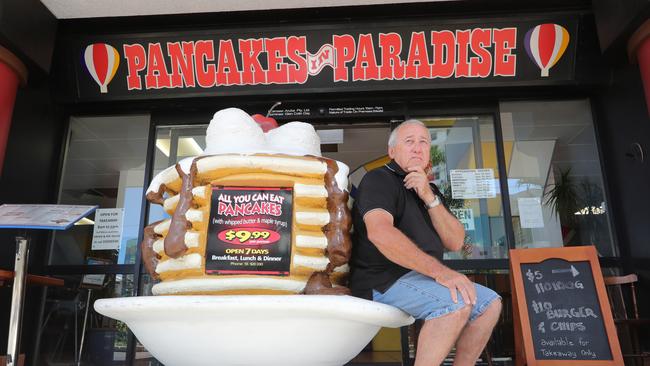
Mr Day, who owns five restaurants on the Gold Coast including Pancakes in Paradise in Surfers Paradise and Coolangatta, said eateries relying on the tourist and family trade typically made most of their money during a few weekends each year.
“The biggest weekends for me as a business were Blues on Broadbeach – bigger than Christmas – and down in Coolangatta, Cooly Rocks On,” he said.
“A lot of restaurants rely on the Christmas trade to keep going through Easter and Easter gets you through to the September holidays hopefully.
“That is what the Gold Coast has always been like. I’ve been in the hospitality trade for 40 years on the Gold Coast and peaks and troughs are what you have to deal with.”
GOLD COAST’S BIGGEST RESTAURANT TRANSFORMATIONS
However, with major events gone as well as tourism from Victoria and most of NSW, the opportunities for restaurants and cafes to make money were limited.
Mr Day said a two-speed economy had been created for eateries.
“Surfers and Broadbeach rely on the family trade and tourists and at the moment there are no tourists here … and families are a bit wary about going out and spending,” he said.
“Then you have areas like Nobbys and Burleigh, which are where the young people who still want to go out and socialise are and they (eateries in these areas) are doing really well.”
Mr Day said changes to JobKeeper, which cuts the fortnightly wage subsidy to $1200 from September 28, would place further pressure on the industry.
“It is going to affect a lot of businesses, you will find a few more will go under because they rely on that money,” he said.
“Most businesses are geared up to what they were taking before the pandemic hit so they have still got those costs and being half down in trade is ... tough. A lot of them won’t make it.”
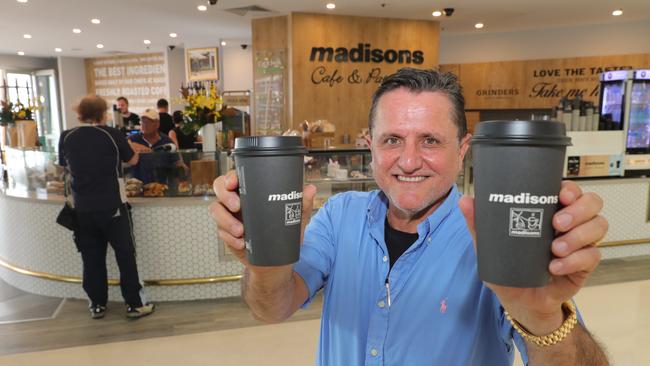
NEW BAR AND RESTAURANT TO REPLACE CLOSED BROADBEACH EATERY
Madison’s Cafe owner Lincoln Testa traded through the six-month period since March 23, first offering takeaway, and then reopened for dine-in customers when restrictions eased.
Mr Testa said the July school holidays proved to be a false dawn for his business in the Oasis Shopping Centre.
“I was thinking we’re getting back to normal,” he said.
“Then we had the Victoria outbreak and NSW and that put the handbrake on.”
Mr Testa said the loss of the Victorian market was a huge blow to the Gold Coast.
“In winter here we get a big influx of Victorian tourists who come for three to six months,” he said.
“We missed out on them.”
MADISON’S CAFE, BROADBEACH
Owner Lincoln Testa took a heavy blow on March 23 being forced to shut his cafe and open for takeaway only.
When he reopened his seating was reduced from 160 to 90 people.
Mr Testa said his business was down significantly from March but he was fortunate to have a strong base of regular customers.
He said he was confident the 11 staff on his books on JobKeeper would qualify when the wage subsidy was adjusted later this month.
HARAJUKU GYOZA BEER STADIUM BROADBEACH
Co-owner Andrew Jeffreys said after March 23 the dumpling and beer outlet closed for three weeks.
When it reopened they added one of their brands to the offering called Fritzenberger so they were doing takeaway for both dumplings and burgers.
“We were doing enough takeaway between Harajuku and Fritzenburger to make it worthwhile,” he said.
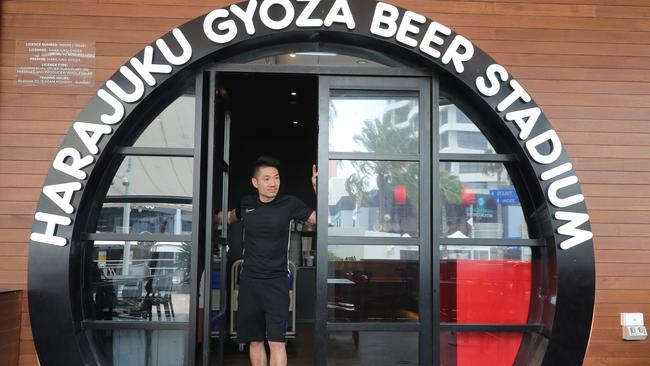
“After a while that little strip in Broadbeach got back to normal. It is not completely back to normal, we’re still 30 per cent down, but too busy to keep doing the burgers.”
Mr Jeffreys said they had to let some staff go as they were on student or working holiday visas and ineligible for JobKeeper.
He said Harajuku in Broadbeach had two staff on JobKeeper and he was confident that would stay the case after September 28.
He said the cancellation of major events had a huge impact.
“The most important period is Blues on Broadbeach. It is huge trade … that is when you make your money for the year. A lot of the rest of the year you are breaking even.”
STEAMPUNK, SURFERS PARADISE
Steampunk’s Grant Rodgers reluctantly shut his Surfers Paradise restaurant’s doors on its third birthday in March and he had to throw away $70,000 to $80,000 worth of food and drink.
However he said he used the period to refine his business offering.
“We closed for eight weeks, which did allow us to do a few things like work on our kitchen, flooring and surfaces,” Mr Rodgers said.
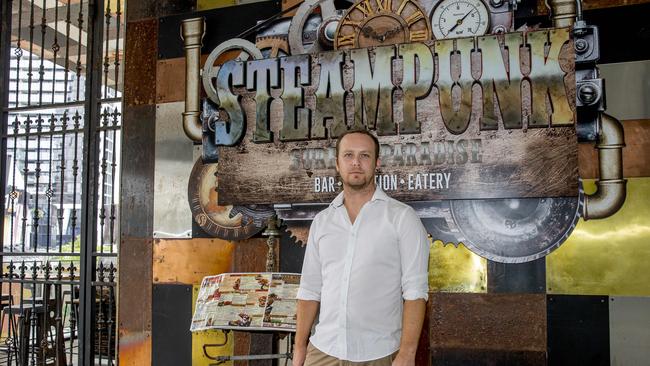
“We’ve grown our takeaway and it’s around 20 to 30 per cent of our revenue currently.
“We changed the menu with more sharing options to allow quicker dining under new restrictions, and brought in an app, which people can order food from their phone when they’re in the restaurant.”
BEACH CAFE AND BAR/LOVE ITALY
Beach Cafe and Bar owner Arthur De Snoo, who also owns Love Italy, said some of the initiatives used during the pandemic might build stronger businesses in the future.
“For us we have utilised a delivery and take away service, particularly for Love Italy,” he said.
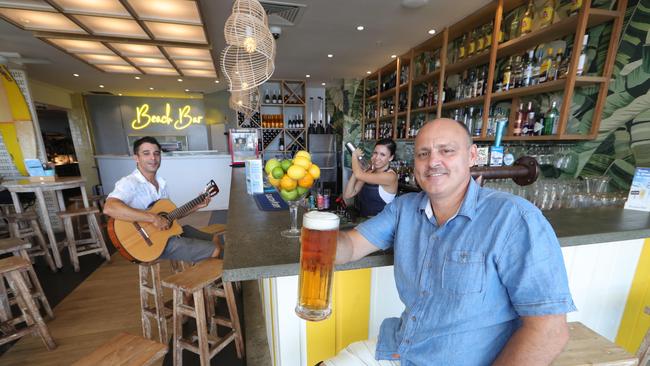
“If we can get back to normal revenue and then add those services, that will help us come out of this tough period.”
Mr De Snoo was concerned at the time the COVID crisis hit that his employees from New Zealand would be forced to return home, but he said thanks to JobKeeper he was able to keep them on.
“They were the first we got back,” he said.

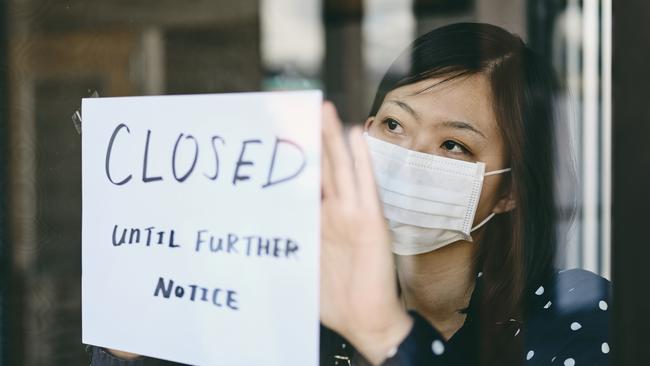
Add your comment to this story
To join the conversation, please log in. Don't have an account? Register
Join the conversation, you are commenting as Logout
More than a theme park: Dreamworld’s dramatic expansion plan
Tourism giant Dreamworld wants to fast track a massive expansion of the theme park, with an incredible array of features including hotels and residential towers. FIND OUT MORE
My rise and fall: $65m brewery co-founder to ‘feeling like a loser’
Three years ago Black Hops craft brewery co-founder Dan Norris had a big stake in his own $65m brand and a $3.1m dream home - now he’s not involved, broke and “ashamed”. SEE THE VIDEO